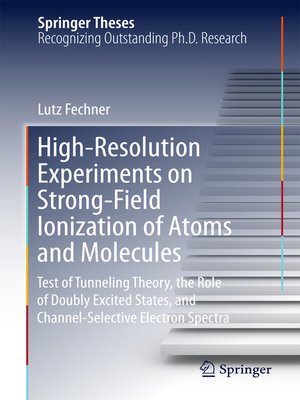High-Resolution Experiments on Strong-Field Ionization of Atoms and Molecules
ebook ∣ Test of Tunneling Theory, the Role of Doubly Excited States, and Channel-Selective Electron Spectra · Springer Theses
By Lutz Fechner

Sign up to save your library
With an OverDrive account, you can save your favorite libraries for at-a-glance information about availability. Find out more about OverDrive accounts.
Find this title in Libby, the library reading app by OverDrive.



Search for a digital library with this title
Title found at these libraries:
| Library Name | Distance |
|---|---|
| Loading... |
In this thesis, the ionization of atoms and small molecules in strong laser fields is experimentally studied using a reaction microscope. The population of autoionizing doubly excited states in the laser fields is proven and a possible connection to the well-known dielectronic recombination processes is discussed.
The fundamental process of tunnel ionization in strong laser fields is subject of investigation in a pump-probe experiment with ultrashort laser pulses. A coherent superposition of electronic states in singly charged argon ions is created within the first, and subsequently tunnel-ionized with the second pulse. This gives access to state-selective information about the tunneling process and allows to test common models. Moreover, the ionization of krypton and argon at different wavelengths is studied, from the multiphoton to the tunneling regime. The wavelength-dependent investigations are furthermore extended to molecular hydrogen. In addition to ionization, this system might undergo different dissociative processes. Channel-selective electron momentum distributions are presented and compared to each other.
The fundamental process of tunnel ionization in strong laser fields is subject of investigation in a pump-probe experiment with ultrashort laser pulses. A coherent superposition of electronic states in singly charged argon ions is created within the first, and subsequently tunnel-ionized with the second pulse. This gives access to state-selective information about the tunneling process and allows to test common models. Moreover, the ionization of krypton and argon at different wavelengths is studied, from the multiphoton to the tunneling regime. The wavelength-dependent investigations are furthermore extended to molecular hydrogen. In addition to ionization, this system might undergo different dissociative processes. Channel-selective electron momentum distributions are presented and compared to each other.







